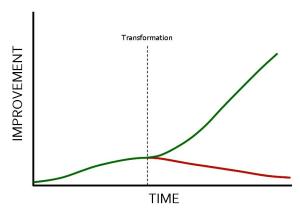One of my favorite blogs
on leadership is John Hunter’s Curious
Cat Management Improvement Connections.
Besides a number of informative posts on a variety of
improvement-related topics, John regularly hosts a management blog carnival,
where various business and leadership blogs are featured.
This year, I’m happy to
participate in the carnival with information on some of the blogs I read on a
regular basis. Reviews of all of the
blogs featured in this year’s carnival can be found at http://curiouscat.com/management/carnival_2012.cfm.
My first review in this
year’s carnival is Peter Drucker’s
Management Philosophy by Jorrian Gelink.
I don’t know Jorrian personally, but after reading his blog, he is
obviously a Drucker zealot with
excellent insight into Peter Drucker’s management philosophy.
Peter Drucker’s teachings
are closely aligned with a lean mindset.
I have always found the information he provided to be a great fit with
W. Edwards Deming’s System of Profound Knowledge, and a necessary component of
effective leadership. Although Deming
regularly attacked Management by Objectives (MBO), I believe he was more
disappointed with how MBO was implemented than the method itself. In fact, Drucker even said that MBO only
works if objectives are carefully thought through, and that 90% of the time,
they aren’t.
I believe much of
Drucker’s teachings have been lost over the last several years, as companies
look for quick and easy ways to “become lean.”
I applaud Gelink for keeping it alive and using it to teach current and
future leaders that Drucker’s philosophy is as relevant today as it was when he
was alive. I enjoy reading Gelink’s
posts and expect to continue to learn from the Peter Drucker’s Management Philosophy
in the future.
Gelink organizes the blog
into four main sections: Executive
Basics, Management Basics, People Management, and Entrepreneurship. There is also an excellent search tool that
makes it easy to find posts on a number of management topics. A sample of Jorrian’s posts is listed below:
Fear
of Conflict – Why Conflict is
Necessary An excellent summary of the
benefits of healthy conflict in any organization. The post reminds me of The Abliene Paradox by Jerry B. Harvey; a story where family
members agree to drive 53 miles to Abilene for lunch, even though nobody really
wants to do it. To avoid conflict,
however, they all go along, have a terrible time, and blame each other upon returning
home. Unfortunately, too many organizations
suffer from the Abilene Paradox because of the absence of open, healthy
conflict.
In the post, Jorrian
writes, “the result of a stronger,
discussed plan is increased effectiveness, and overall satisfaction of those
involved because their input was considered into it.”
What
is Our Mission? The Heart of the Organization Whether deploying lean or not, the importance
of a clear and unchanging purpose is critical to success. Without a clear mission, there is no team –
there is only a group of individuals who define success on their own
terms. Any success without a consistent
purpose is accidental and destined to be short-lived.
In providing direction for
defining the purpose, Jorrian wrote, “the
mission starts with what is on the outside of the organization; not with what
is inside. Entrepreneurs that fail are
the ones that do what they want to do, instead of what their customer wants.” Examples of mission statements from
successful technology-based companies are provided within the post.
In Personal
Development – Becoming Effective in Your Role, Jorrian provides the
distinction between being effective
and efficient, specifically that
effectiveness results from doing the right things.
The post hits on one of
Drucker’s most important teachings – the idea that understanding, developing,
and continually using your strengths is what leads to success. Jorrian writes that aligning individual
strengths with the organization will lead to increased effectiveness and
personal success.
I have so many interesting
books on reading list that I will never have the time to complete. As with Deming, I learn a great deal each
time I re-read one of Drucker’s books because he had so much to teach. Reading Peter Drucker’s Management Philosophy
allows me to keep up on Drucker’s theories even when I don’t have the time to
re-read his books.
More information on the
2012 Management Improvement Blog Review can be found at http://curiouscat.com/management/carnival_2012.cfm. For specific posts from this year’s carnival,
please go to http://management.curiouscatblog.net/category/carnival/.





